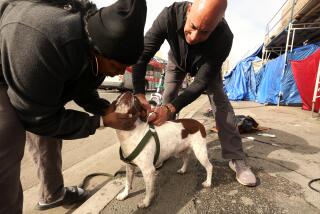Vaccines, Exams Vital for Pets
- Share via
In this column, I will discuss several of the more common questions that pet owners ask of veterinarians. Future columns will deal with specific questions from pet owners.
Vaccines are the best method for prevention of common viral diseases to which pets are exposed, especially when they are very young. The mother passes some of her immunity to her offspring when they first begin to nurse, but this “maternal immunity” does not last long.
Most owners ask about which vaccinations are necessary for their new cat or dog.
Cats are routinely vaccinated against panleukopenia or feline distemper, a viral disease that decreases the white blood cells, causing fever, diarrhea, depression, weakness and, often, death. Feline vaccines also offer protection against rhinotracheitis, calici and pneumonitis--three of the most common and highly contagious respiratory diseases that affect cats. These diseases can cause sneezing, coughing, runny eyes and, occasionally, sores in the mouth or on the tongue.
A vaccine against feline leukemia virus (FeLV) has recently been developed and should be included as an important part of safeguarding your cat’s health. Blood tests can be performed to determine your cat’s FeLV status.
Dogs are usually given a single-dose injection called “DHLPP.” This injection vaccinates against canine distemper, a contagious and sometimes fatal viral disease that affects the gastro-intestinal and respiratory systems and, most severely, the neurological system. Hepatitis, parainfluenza (kennel cough) and parvo are other viral diseases included in this vaccination. Leptospirosis is included to protect against infection of the kidneys and liver. It is also recommended that your dog be vaccinated against bordetella, the bacterial form of kennel cough.
About the time puppies or kittens are weaned from their mother, approximately 6 weeks of age, they should be examined by a veterinarian. A primary “kitten or puppy” vaccination is given to stimulate the pet’s own immune system to develop antibodies against the above-mentioned diseases. “Adult” or secondary vaccinations are then given at 8-9 weeks and 10-12 weeks of age. A cat generally is given a rabies vaccination at 12 weeks and a dog at 16 weeks. Yearly booster vaccinations are necessary to maintain your pet’s protection.
I have often been asked whether an older dog or cat needs to continue receiving yearly vaccinations. Just as young animals need to develop their immune systems, older pets especially need the added stimulus to keep their waning immunity adequate.
The best protection for your pet’s health starts with yearly examinations and vaccinations by your veterinarian.
More to Read
Sign up for Essential California
The most important California stories and recommendations in your inbox every morning.
You may occasionally receive promotional content from the Los Angeles Times.













